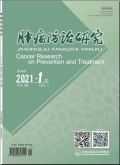肿瘤防治研究2024,Vol.51Issue(7):578-582,5.DOI:10.3971/j.issn.1000-8578.2024.23.1364
基于多靶点粪便FIT-DNA联合检测技术的结直肠癌早筛应用研究
Application of Colorectal Cancer Early Screening Based on Multitarget Fecal FIT-DNA Joint Detection Technology
摘要
Abstract
Objective To evaluate the efficacy and further analyze the application prospects of the combined multitarget fecal FIT-DNA assay in the early screening of colorectal cancer.Methods Subjects were selected from a population attending the Inner Mongolia Medical University Hospital.Each subject underwent a combined multi-target fecal FIT-DNA test(experimental group),a serum tumor marker test and enteroscopy(control group).The pathological results were used as the gold standard to evaluate the efficacy of novel fecal molecular testing techniques for colorectal cancer screening with timely intervention given to screen positive individuals.Results The data of 115 individuals were analyzed.Serum tumor markers test had a sensitivity of 63.2%(43/68)and a specificity of 74.5%(35/47).The enteroscopy had a sensitivity of 97.1%(66/68)and a specificity of 80.7%(38/47);the combined multitarget fecal FIT-DNA test had a sensitivity of 89.7%(61/68)and a specificity of 87.2%(41/47).Conclusion The sensitivity and specificity of multitarget fecal FIT-DNA combined detection are better than those of serum tumor marker detection.Although its sensitivity is lower than enteroscopy,its operation is simpler and can be tested at home.关键词
多靶点粪便FIT-DNA联合检测/血清肿瘤标志物/结直肠癌/早筛/肠镜检查Key words
Combined detection of multitarget fecal FIT-DNA/Serum tumor markers/Colorectal cancer/Early screening/Enteroscopy分类
医药卫生引用本文复制引用
王杰,侯明星,程海东,刘永强,苗杰,李淑雯,陈璐..基于多靶点粪便FIT-DNA联合检测技术的结直肠癌早筛应用研究[J].肿瘤防治研究,2024,51(7):578-582,5.基金项目
China Cancer Foundation Project(No.NH2018002)中国癌症基金会科研项目(NH2018002) (No.NH2018002)

